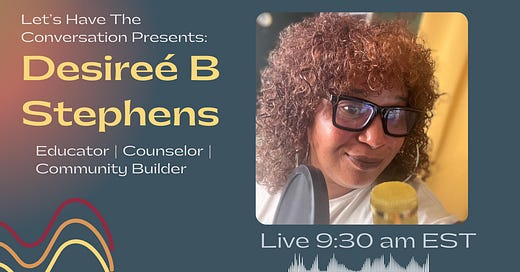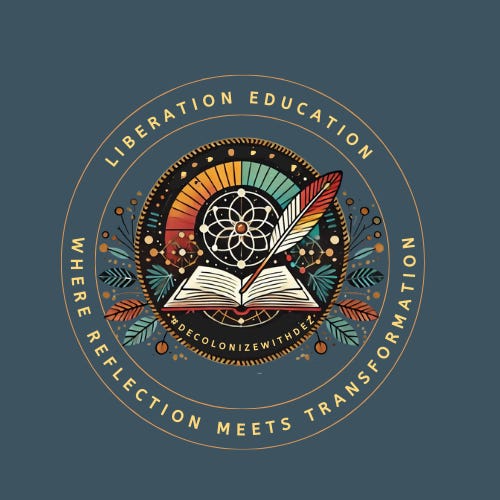First and foremost I want to lead wkth saying thank you for your patience as I was waiting hoping for the original to be restored and sadly they were not able to recover the video So I just recorded the points of the day. So thank you so much, let’s bgin.
So many of us are walking around with wounds that we’ve learned to call “normal.”
We’ve been trained to mistake control for leadership, perfectionism for care, and defensiveness for protection. But these aren’t personality traits—they’re patterns. And many of them were shaped by systems we didn’t choose. Supremacy culture has coded itself into our nervous systems, our homes, our workplaces, and our relationships.
And now?
We’re being called to unlearn.
Not just for ourselves—but for the communities we’re trying to build.
This work of dismantling oppressive systems? It doesn’t just happen out there. It begins in here. In how we speak to one another. In how we hold power. In how we repair when we get it wrong.
Free Reflection (No Clip Today)
Even though there’s no replay from the live today, I want you to pause and sit with this:
“Not all harm is intentional. But all harm requires response.”
Think about the last time you felt unseen or unheard in a relationship.
Now flip it—think about the last time you might’ve been the one holding the mic too tightly, leading with fear, or silencing someone without meaning to.
This isn’t about shame. It’s about awareness.
Because we can’t heal what we won’t name.
Ask yourself today:
What patterns are present in your life because they once kept you safe—but are now keeping you stuck?
Three Key Takeaways
1️⃣ Harmful Patterns Are Often Rooted in Supremacy Culture
When we default to control, defensiveness, or needing to “do it all perfectly,” we’re not just being “difficult”—we’re replicating systems that reward dominance over dialogue.
Example: A team member who won’t share decision-making power isn’t just being assertive—they may be reenacting hierarchy they’ve internalized as safety.
Reflection: What patterns have you observed in your relationships, and where did they originate?
2️⃣ Unlearning Requires Self-Awareness and Accountability
Unlearning doesn’t start with blaming others—it starts with seeing ourselves clearly.
It means holding a mirror to our actions, without weaponizing shame.
Example: A leader who realizes they micromanage can shift from “I’m just trying to help” to “How can I build more trust here?”
Reflection: Where in your life do you need to practice self-awareness to begin unlearning harmful behaviors?
3️⃣ Unlearning Is an Ongoing Process
This isn’t a 30-day challenge. It’s a lifelong conversation.
Liberation means staying in the work even when it’s uncomfortable. Especially then.
Example: People who reflect through journaling, therapy, or intentional community are not “fixing themselves”—they’re practicing growth in real time.
Reflection: What ongoing practices can you adopt to support your process of unlearning and growth?
Harm Happens at Every Level—But So Does Healing
We need to name this:
Harm is not just something “bad people” do.
It happens in systems—and it happens in relationships.
It happens in policies and power dynamics.
But it also happens in how we talk to our partners, our coworkers, our children, our community.
And most of the time, harm doesn’t start with intention.
It starts with patterns.
It starts with roles we learned in systems that taught us survival over self-awareness.
Maybe we learned to dominate because domination looked like safety.
Maybe we learned to people-please because dissent was punished.
Maybe we became hyper-independent because vulnerability was never modeled.
But here’s the liberatory truth:
When we build self-awareness, we begin to see the system—not just the symptom.
We start to notice how white supremacy, patriarchy, ableism, and classism live inside our behaviors—not just in our institutions.
And that’s where the shift happens.
When we can say:
“This isn’t just how I am. This is a pattern I inherited. And I get to do something different.”
Accountability, then, becomes a portal. Not to punishment. But to possibility.
We take ownership not to shrink ourselves, but to set ourselves free—and create safer, more liberatory relationships in the process.
Practice Your Praxis
Here’s how to bring these teachings into your body, your home, and your relationships:
Try This:
Track your pattern: Notice one recurring reaction this week (defensiveness, shutdown, control) and get curious—not critical—about its root.
Ask for feedback: Invite someone you trust to gently share when they notice you slipping into a harmful pattern.
Pause before response: Build in a breath before reacting. What’s the deeper need beneath the reaction?
Journal Prompts:
What behavior do I default to when I feel unsafe? What does it protect me from?
How can I practice accountability without self-punishment?
What is one new pattern I want to replace an old one with?
In Conclusion
You are not your patterns.
You are the person becoming aware of your patterns.
And that awareness? That’s everything.
We don’t need to be perfect to be in community.
We just need to be willing to pause.
To listen.
To repair.
So today, I honor you not for having it all figured out—but for being willing to figure it forward.
Reminder tha tomorrow is a community wide day of intentional rest so our article will be about rest and we will return for Day 78: The Power of Care in Transforming Systems
But today, we breathe.
We reflect.
We begin again.
In solidarity and liberation,
Desireé B. Stephens, CPS-P
Educator | Counselor | Community Builder
Founder, Make Shi(f)t Happen
Thank you
, , and many others for tuning into my live video! Join me for my next live video in the app.




Oh no! And this particular theme today was one I really wanted to sink my teeth into because I am so aware of how my trauma manifests in my relationships. Thank you for creating a summary Desirée!